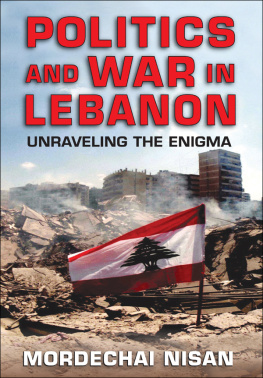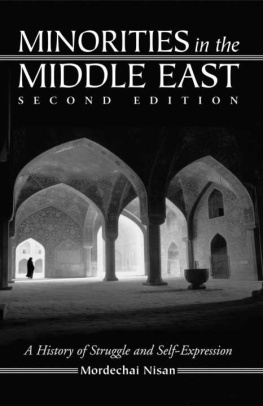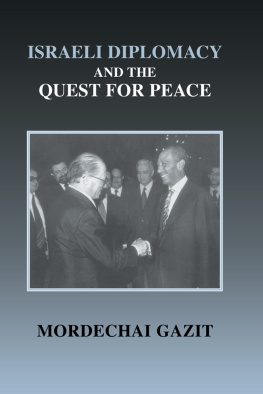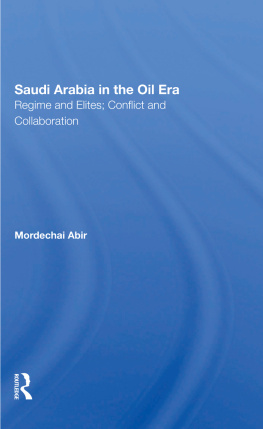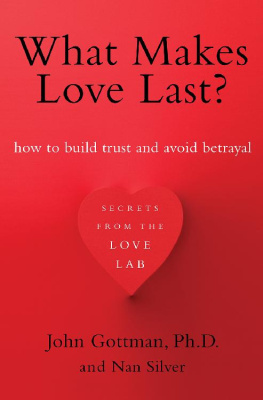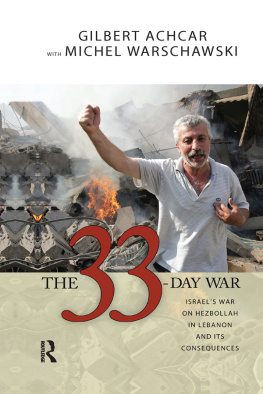POLITICS
AND WAR IN
LEBANON
POLITICS
AND WAR IN
LEBANON
UNRAVELING THE ENIGMA
MORDECHAI NISAN
First published 2015 by Transaction Publishers
Published 2017 by Routledge
2 Park Square, Milton Park, Abingdon, Oxon OX14 4RN
711 Third Avenue, New York, NY 10017, USA
Routledge is an imprint of the Taylor & Francis Group, an informa business
Copyright 2015 by Taylor & Francis.
All rights reserved. No part of this book may be reprinted or reproduced or utilised in any form or by any electronic, mechanical, or other means, now known or hereafter invented, including photocopying and recording, or in any information storage or retrieval system, without permission in writing from the publishers.
Notice:
Product or corporate names may be trademarks or registered trademarks, and are used only for identification and explanation without intent to infringe.
Library of Congress Catalog Number: 2014036155
Library of Congress Cataloging-in-Publication Data
Nisan, Mordechai.
Politics and war in Lebanon : unravelling the enigma / Mordechai Nisan.
pages cm
Includes bibliographical references and index.
ISBN 978-1-4128-5667-6
1. Lebanon--Politics and government--1946- 2. Lebanon--History--Civil War, 1975-1990. 3. Lebanon--Foreign relations--Syria. 4. Syria--Foreign relations--Lebanon. 5. Arab-Israeli conflict. I. Title.
DS87.N54 2015
956.9204--dc23
2014036155
ISBN 13: 978-1-4128-5667-6 (hbk)
To
Etienne Sakr (Abu Arz)
the conscience of Lebanon
Contents
American University of Beirut (AUB)
Arab Deterrent Force (ADF)
Arab Liberation Army (ALA)
Arab Liberation Front (ALF)
Communist Party (CP)
Constitutional Bloc (or Union)
Fatah (Palestinian National Liberation Movement)
Free Patriotic Movement (FPM)
Free Syrian Army (FSA)
Guardians of the Cedars (GOTC)
Hezbollah (Party of God)
Islamic State of Iraq and a-Sham/Syria (ISIS) [Daesh]/IS (Islamic State)
Israel Defense Forces (IDF)
Kataeb (Phalanges)
Lebanese Forces (LF)
Lebanese Front (LF)
Lebanese National Movement (LNM)
Marada Movement
Movement of the Disinherited (Harakat al-Muhrimin)
Muslim Brotherhood (MB)
National Bloc (NB)
National Liberal Party (NLP) (Al-Ahrar)/Tigers (Noumour)
Palestine Liberation Army (PLA)
Palestine Liberation Organization (PLO)
Popular Democratic Front for the Liberation of Palestine (PDFLP)
Popular Front for the Liberation of Palestine (PFLP)
Popular Front for the Liberation of Palestine General Council (PFLP-GC)
Progressive Socialist Party (PSP)
SAIQA (Lightning) (Palestinian Baathist faction)
South Lebanese Army (SLA)
Special Tribunal for Lebanon (STL)
Syrian Baath Party
Syrian Protestant College (SPC)
Syrian Social National Party (SSNP) (Parti Populaire Syrienne [PPS])
United Nations Interim Force in Lebanon (UNIFIL)
United Nations Relief and Works Agency (UNRWA)
Universit St. Joseph (St. Joseph University)
Zghorta Liberation Army (ZLA)
The riddles of the Middle East pose a major challenge for policy practitioners and students alike. The history of the region has known religious eruptions, political cataclysms, and historical shifts that surprised and confounded onlookers everywhere, and this is the case until today. The contemporary war being fought within the fold of Islam, between the Sunnis and the Shiites, a war that expresses profound animosity and savagery, attests to a major malaise in this mass religion originating from Arabia. So too the deep fissures in the native states across the region, as tribes/ethnicities/sects battle the existing state system and reflect primordial loyalties that do not accommodate or submit to the dominating ruling regime, national ethos, and borders. Through these conflicts reverberates the unresolved, delicate, and divisive issue of order and liberty, which requires a political balance that will serve the collectivity without suffocating the individual.
The pervasive problems touching religion, nationalism, and tribalism are visible in the Fertile Crescent, in Iraq and Syria, Lebanon and Jordan, and in North Africain Egypt, Libya, Tunisia, Algeria, and Morocco. This is so in Yemen and Saudi Arabia as well. Among the existing states with a historical mold and foothold, Egypt and Lebanon resonate with a sense of nationhood despite the potential for fragmentation based on religionthis while acrimony fills the political arena as the state apparatus and institutions serve with difficulty public needs and popular aspirations.
Lebanon, a small country with a great historical mission, is a conundrum beaming mixed messages and internal contradictions. It is ill-understood and often underreported; the terminology applied to Lebanon often misses the case in point. Its government mechanics are a mystery; its national identity, a riddle; its survival, a miracle. Even the whos who in the national roster escapes the seasoned eye.
Many basic questions cloud a clear perception of Lebanon. Is it an Arab country or not? Is it a democratic country, the only one it was conventional to suggest in the Arab world? Is there a single Lebanese people? What really caused the breakdown and warfare in 1975? Was it a civil war? How divisive is religion in Lebanon? Was Syria a friend or foe of Lebanon, a savior or a destroyer of Lebanon? Why has the country been an arena for voluminous violence?
Our study offers somewhat of a revisionist interpretation of Lebanon by challenging widely accepted opinions about its national profile, the causes and character of the war that erupted in 1975, and the role of Syria in particular in Lebanon. We will not reconstruct Lebanon but minimally deconstruct building blocks of what are injudiciously considered central features and events pertaining to the country in modern times.
This book sets for its purpose the elucidation of Lebanons character and politics. When Winston Churchill observed Russia and its actions at the beginning of the Second World War, he confessed, It is a riddle wrapped in a mystery, inside an enigma: but perhaps there is a key. That key is Russian national interest. Churchill confessed that there was a rationale to the perplexing behavior of Russia, as it ideologically turned around to sign a nonaggression pact with Nazi Germany. Lebanon too is an obscure riddle: in its political constitution and democratic culture, in the operation of its institutions of government, in its mode of operation amidst religious pluralism. No small number of writers and specialists derisively dismiss Lebanon; misrepresent it; avoid noting central events in its modern history, oblivious of its regional importance; and fail to appreciate that blockage in the regimes functioning is not a failure of talent but due to, beyond the caprice of corruption, a combined assault on its sovereignty from within and without. It must ultimately strive to be true to itself and its interests.




